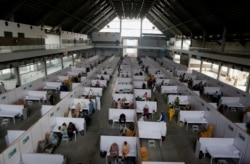Pakistan Prime Minister Imran Khan has tested positive for COVID-19, two days after he was inoculated against the pandemic disease.
Federal Health Minister Faisal Sultan confirmed Saturday that Khan has contracted the coronavirus infection and wrote on Twitter the 67-year-old Pakistani leader “is self- isolating at home.”
Khan’s office released a video Thursday while he was receiving his first shot of the two-dose Chinese Sinopharm vaccine as part of a nationwide drive to encourage vaccinations.
The prime minister at the time had appealed to the nation to ensure compliance with all safeguards to help prevent the spread of COVID-19.
The South Asian nation is witnessing high levels of vaccine hesitancy, officials say.
The Federal Health Ministry clarified in a statement that Khan was not “fully vaccinated” before he contracted the virus.
“He only got the 1st dose and merely 2 days ago, which is too soon for ANY vaccine to become effective. Anti-bodies develop 2-3 weeks after 2nd dose of 2-dose COVID vaccines,” the ministry wrote on Twitter.
Sources in the prime minister’s office told VOA that Faisal’s revelation prompted a number of staffers and officials working closely with Khan to rush to hospitals to undergo tests for COVID-19.
The United States embassy in Islamabad, on its Twitter account, wished Khan a speedy recovery.
Pakistan, a nation of 220 million people, is experiencing a sharp rise in coronavirus infections, prompting authorities to introduce fresh restrictions to help contain new cases.
Authorities have locked down hotspot neighborhoods in major Pakistani cities, including the national capital, Islamabad, and they again have closed educational institutions. A British variant of the virus is being blamed for the flare-up in new cases.
The overall number of infections and deaths from COVID-19, however, remain under control in Pakistan. Since the pandemic hit the country a year ago, officials have documented more than 623,000 cases of infections and nearly 13,800 deaths, with about 3,900 cases and 42 deaths recorded on Friday.
Officials report the national positivity ratio surged to 8% this week.
The Pakistani government began last month vaccinating frontline health care workers and citizens age 60 and above.
Close allay China has donated to Pakistan 1 million doses of the Sinopharm vaccine.
Asad Umar, the minister overseeing the government's COVID-19 response, told local media that Pakistan also will import 1 million doses of COVID-19 vaccines from two Chinese companies by the end of this month.
Pakistan also is scheduled to receive 17 million doses of AstraZeneca’s coronavirus vaccine through the World Health Organization's COVAX program. The global program is meant to vaccinate people in low- and middle-income countries against COVID-19.
The plan aims to deliver at least 2 billion vaccine doses by the end of 2021 to cover 20% of the most vulnerable people in 91 nations across the globe.





